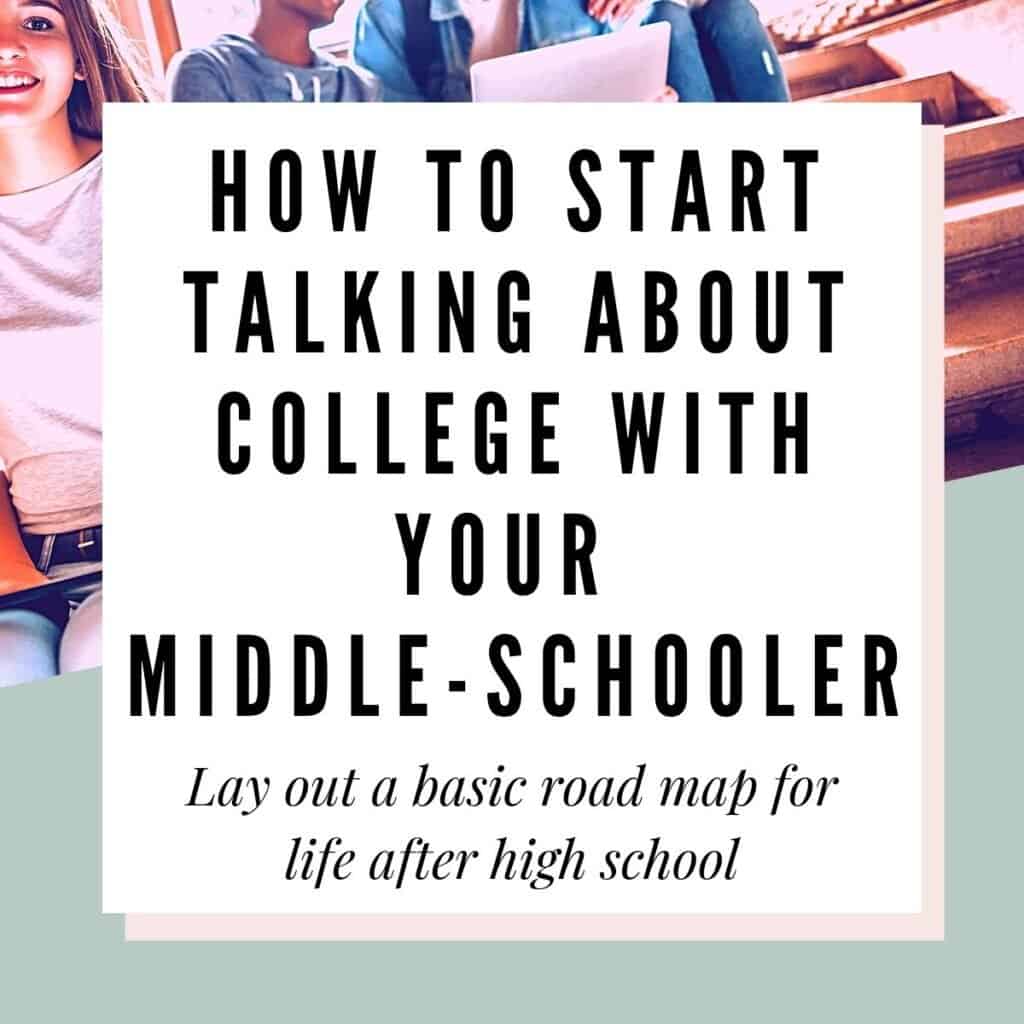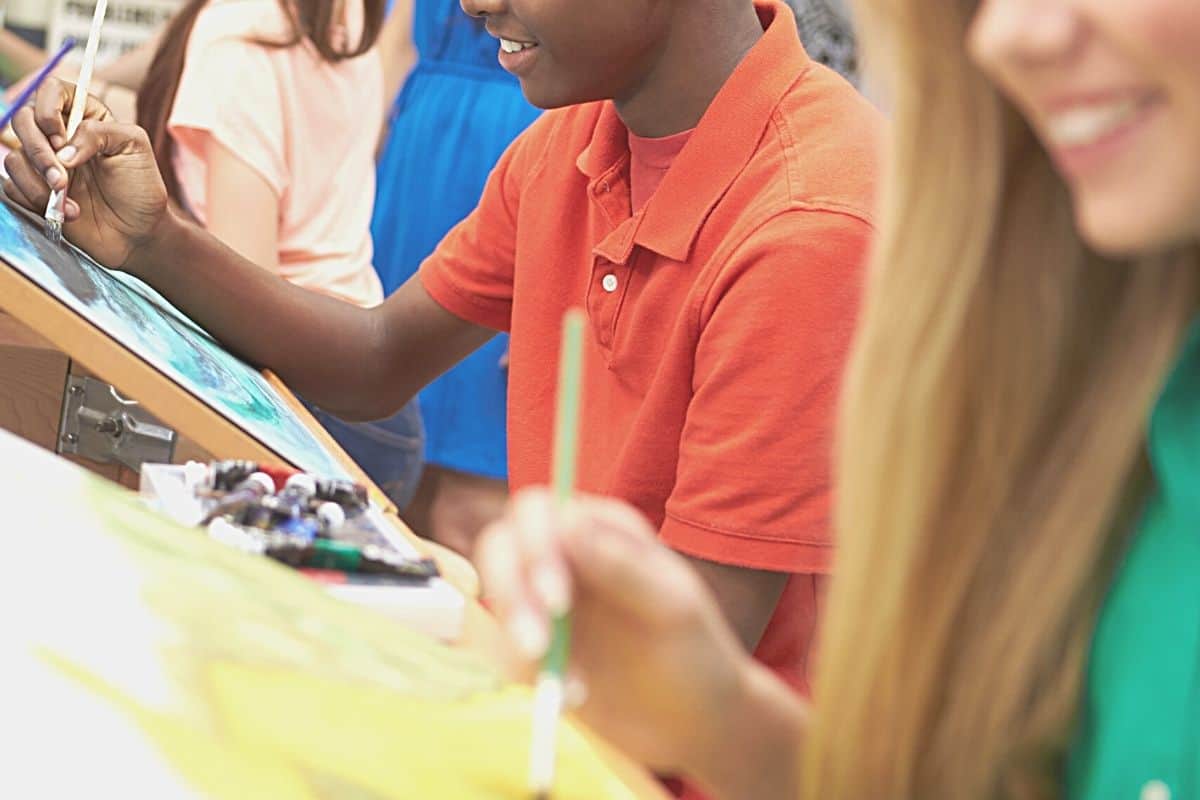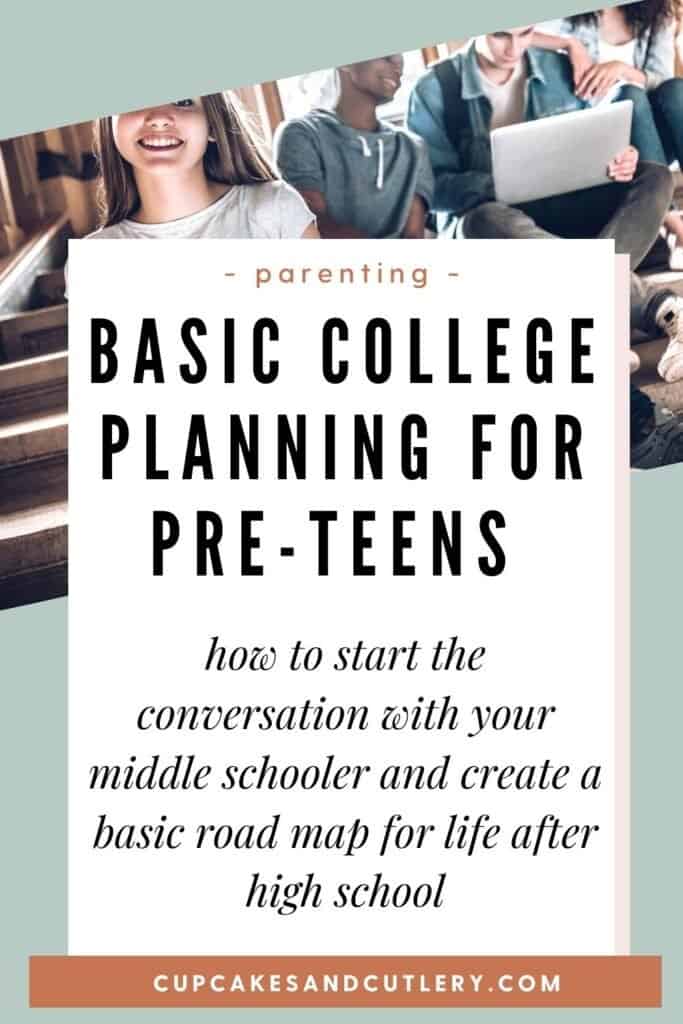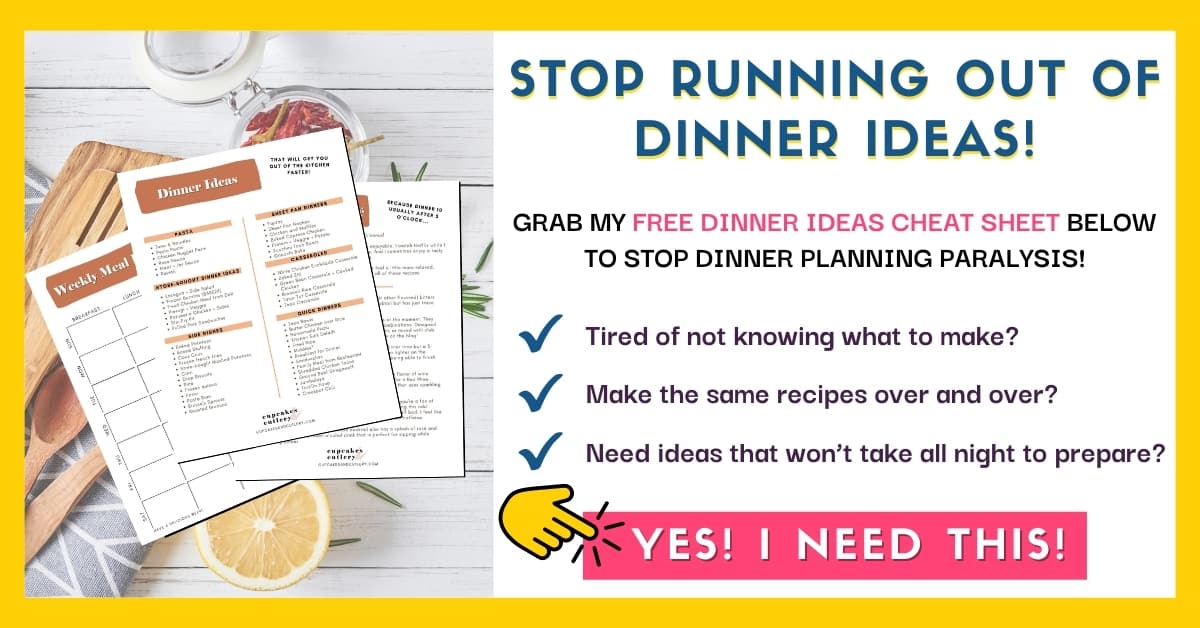College Planning With Your Middle School Student
With my oldest son, I struggled with getting him to think about planning ahead while in junior high. And after talking to other moms, I now know the best way to start college planning with your Middle School Student! It’s low stress but a great way to just get the ball rolling.

Why to Start Talking to Your Kids About College Early
When my first child started picking classes for junior high (or middle-school if that’s what it’s called in your area), I realized that it was time to have our first chat about college planning.
I know that seems early, but I think that it’s pretty important, now more than ever.
While I knew that he wouldn’t be choosing which college to attend at this stage of the game, I really wanted to make sure that he was working towards the requirements that would help him get to where he wanted to be in life.
It was a struggle to get him to understand that in order to set yourself up for the future, you need to look ahead and work backward.
But I had some learning to do too. I was often frustrated when he couldn’t see the importance and just wanted to take fun classes. But now I know that there can be a balance and a better way to start college planning with your junior high-aged child.
We’ll be planning a graduation party before we know it.
Middle school is a whole new world for both students and parents. You go from planning elaborate birthday parties for them to suddenly talking about them moving out. This is the time when the kids get more choices about lunch, extracurricular activities, sports teams to participate in, and elective courses.
Middle school is the stepping stone from elementary school to high school. For many, it’s less about grades and more about trying to take ownership of the school journey as well as navigating the social side of things.
But middle school is also a time for students to start thinking about their career road map and how to get there.
As parents, we want to know what to ask and how to support students to reach their goals and help set them up for success. So how do you open the conversation without adding stress or having the wrong expectations?
Here are some beginning college planning tips to keep in mind:
How to Start Planning for College While In Junior High

1. Talk with your student
A basic, low-stress conversation is a great start to talking about college goals. Ask them, “What do you want to do after high school?” If your student is unsure, encourage them to pick three potential careers that they find interesting and begin exploring what kind of schooling or degree they may need for that job.
Have them pay attention to requirements to see if they need vocational experience, trade school, a college degree, or even a masters’ degree.
This doesn’t have to take much time and you can have them do this on their own but it might even be better to do it with them. This can even be done if they have no clue about what they want to do for work.
If they like to play video games, use that as an example. You really just want to show them how to look at the journey to get to a successful career.
As you learn more about the potential career, you can show them how to work backward to see what types of classes would be best for them to take as they work through junior high and high school.
One thing I learned was that it was important to keep reminding my kid that there were requirements for not only graduation but also certain requirements for each college.
While junior high is often the first time they have any say over their classes, it’s best to go into it knowing that it there should be some structure too.
That being said, you don’t need to be completely rigid. 7th and 8th grade is the perfect time to try out some new courses like art, languages and engineering. I tried to guide my kids to take a well-balanced mix of classes to see what they were drawn to.

2. Make it Visual
Have your student draw a basic timeline of where they are now and when they want to be, like a road map. Some kids (and me) do better when they can visualize a path rather than just thinking about it.
Kids don’t have a concept of college life and so it’s more about the loose career goal at this point. If they don’t know what they want to be when they grow up (and many of us still don’t :), choosing a few that seem interesting can still show them there is a path to get to that end goal.
This outline can help guide the rest of the conversations and as electives, extracurricular activities and work experience come up, they can be added to the road map.
Resource: Check out Triangle Senior Year! They are a great resource for applying to college. Their site is laid out in a visual way that can let your kids see what the process will look like. Sometimes seeing something on a website is taken more seriously than what mom says, unfortunately…
More formal college planning happens in the high schools in 10th grade. But I found that my kid was already stuck on the classes he wanted to take rather than what would give him the best college plan.
In our area, the local colleges are severely impacted so getting accepted is really tough. This road map is a way to show them how to make sure they are seizing the best opportunities instead of finding out when it’s too late that they should have done something different.

3. Embrace Electives and Activities
My son was excited about the electives when he got to junior high. And for my second child, it was the first time he could take a school class that was focused on art, which he loves.
Encourage your kids to look at electives that they may not have had access to before, like art, industrial technology classes, computer program, graphic design, etc. This may spark something in them that they want to explore further, which may turn into a career path.
Similarly, extracurricular activities like a cooking club, sports, volunteer opportunities and student council, can show kids where they excel and what they might be suited for later in life.
While looking at the road map, you can talk about how even the activities that might not seem to connect to a future job really are connected. Often it can be hard for kids to see how things like student leadership are great for learning how to work in groups and how to shine as a leader.

4. Talk to Other Adults (Both You and Your Kid)
Encourage your student to have college planning and career conversations with people other than you.
There is not always one direct path to the endpoint so it’s good for your kid to hear from other adults how they got to where they are.
It will reinforce to them how it’s important to stay focused on their goals. It will show them that you aren’t just overreacting (I’ll be the first to admit I came on real strong with my first kid).
And it may share some “I wish I knew then” moments that will help your kid understand why planning ahead is so important.
We are lucky to have a few family members and friends that are a few years ahead and starting their college experience. Talking to them about scholarships, tests and issues they’ve had to overcome is a great opportunity for your kids to learn more about the process.
Some questions your kid could ask are:
- How did you decide your career?
- What is the training you needed?
- What were activities, clubs, classes you took to help you decide?
- When did you start planning for college?
- What do you wish you had known ahead of time?
Also, I started talking about college planning with other local parents.
From my sister-in-law, I learned that while starting at a junior or community college and transferring sounds like a great option, we need to keep in mind that because of how many students attend these schools, actually getting the classes they want can be a challenge. She found that is often takes longer than 2 years to get all the requirements completed before you can transfer.
There are so many decisions that will need to be made, but it is extra hard if you go into it without all the information. Take every chance you can to learn more, even if your kid isn’t quite to that stage.
5. Keep it in Perspective
Remind your student (and yourself) that this is just the beginning. It’s ok to not have all the answers. And the road to college acceptance can be bumpy.
I always try to remind myself that my kids are very different from myself and my hubby and that their college journey will be very different from ours. As the world continues to change, the college experience will change.
While I don’t think a college degree would ever be a bad thing, I understand it isn’t possible for so many individuals due to cost, grades, family obligations, etc. And you can certainly be successful without a degree.
I also try to share about the college life side of things to talk about how fun that stage of life is. Planning for college can seem stressful, but there are so many positives once you get there.
*If you need a great book for your soon-to-be-college-age student I LOVE this one: College Health Guide. It’s all about how to stay healthy and safe in terms of exercise, diet, drinking and even sex. It’s written in a way that is easy to read and is a great look at first-time independence.*
Knowing that middle school is a time for change, students may find it difficult to think that far ahead. And it’s ok if their road map changes often.
From 7th grade to 10th grade, they will grow up so much. Their views and passions may change and that is totally fine. Starting the college planning conversation in middle school shows them the bigger picture and shows why class selection and extracurriculars are important.
Hopefully, your high school counselors can help guide the actual college planning starting in 10th grade. I’m grateful for the school we are in and they have been super great in guiding our next steps.
Keep an eye out for the things your child responds to during the conversation and maybe that can be your opening to future conversations.



